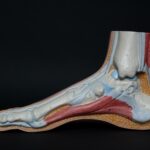As an athlete, ensuring optimal performance is your ultimate goal. And while you may already be focused on building strength, endurance, and honing your skills, there’s an often overlooked aspect that plays a crucial role in your success: caring for your tendons. These resilient connectors between muscles and bones are essential for peak performance, but are also susceptible to injuries that can hinder your progress. In this essential guide, we’ll explore the importance of caring for your tendons, and reveal effective techniques and exercises that can not only help prevent injuries but also enhance your overall performance. So, buckle up, because it’s time to dive deep into the world of tendon health and discover how it can catapult you towards your athletic ambitions.

The Importance of Caring for Tendons
Tendons play a crucial role in our ability to move. As the tough connective tissues that link our muscles to our bones, they enable us to perform everyday activities and engage in physical exercise. However, tendons are not invincible and can be susceptible to damage. This is why understanding and prioritizing the importance of caring for tendons is vital for maintaining optimal performance and preventing potential injuries. In this article, we will explore key aspects of tendon health and effective strategies to keep them in top shape.
The Anatomy and Function of Tendons
To fully appreciate the significance of caring for tendons, we must first understand their anatomy and function. Tendons are strong, flexible tissue bands that transmit the force generated by our muscles to our bones. They allow for movement by enabling muscles to contract and relax. Without healthy tendons, our ability to perform physical activities would be severely compromised.
The Consequences of Tendon Damage
Tendon damage can occur due to various factors, including overuse, injury, aging, and certain health conditions such as arthritis. When tendons become injured or inflamed, it can result in pain, limited range of motion, and decreased performance. Chronic tendon conditions, such as tendinopathy, can be particularly troublesome and hinder athletes and individuals from reaching their full potential.
Prevention is Key
The old saying “prevention is better than cure” rings particularly true when it comes to caring for tendons. Taking proactive steps to maintain healthy tendons can significantly reduce the risk of injuries and improve overall performance. One fundamental aspect of prevention is maintaining a balanced exercise routine. By incorporating a variety of exercises that target different muscle groups, we can distribute the workload evenly across our tendons, reducing the likelihood of overuse injuries.
Nutrition for Tendon Health
Proper nutrition is another crucial element in caring for tendons. Collagen and calcium are essential components for maintaining healthy tendons. Collagen provides strength and structural support, while calcium contributes to overall tissue health. Including foods rich in these nutrients, such as lean proteins, dairy products, nuts, and leafy greens, in our diet can help keep our tendons in optimal condition.
Exercise Strategies for Tendon Care
In addition to a well-rounded exercise routine, specific physical therapy exercises can be beneficial for preventing and treating tendon injuries. Eccentric strengthening exercises, which involve lengthening the muscle/tendon while it is under tension, have shown promising results in chronic tendon conditions. These exercises help promote tendon remodeling and healing, effectively addressing the underlying issue.
Common Tendon Injuries and Treatments
Rotator cuff repairs are a prevalent tendon injury that many individuals, especially athletes, may encounter. Proper rehabilitation following a rotator cuff repair is vital for a successful recovery and the restoration of full function. Physical therapy, including targeted exercises and manual therapy techniques, can greatly assist in this process.
Aging and Tendons
As we age, our tendons naturally undergo changes. They become thinner and accumulate microscopic damage over time. These age-related changes can make tendons more vulnerable to injuries. However, by adopting preventive measures and maintaining overall fitness and flexibility, we can mitigate these effects and keep our tendons resilient and functional.
In conclusion, caring for tendons is of utmost importance in ensuring optimal athletic performance and preventing debilitating injuries. By understanding the anatomy and function of tendons, prioritizing prevention, and incorporating exercises that promote tendon health, we can enhance our overall well-being and minimize the risk of long-term damage. Remember, healthy tendons are the foundation for achieving peak physical performance.
Quote: “Caring for tendons is not just about preventing injuries; it’s about optimizing your body’s ability to perform at its best.”
To summarize the importance of tendon care:
- Maintain a balanced exercise routine to prevent overuse injuries.
- Consider nutrition as a crucial aspect of tendon health.
- Incorporate specific exercises, such as eccentric strengthening, to promote tendon remodeling.
- Take necessary steps to recover from common tendon injuries, such as rotator cuff repairs.
- Adapt to age-related changes in tendons through preventive measures and overall fitness maintenance.
By valuing and prioritizing tendon care, you can enhance your performance, reduce the risk of injury, and promote long-term well-being. So, let’s give our tendons the attention they deserve and unlock our full potential!
The human body is a remarkable machine, with every part playing a vital role in our daily movements. When it comes to mobility, tendons are unsung heroes, facilitating the smooth functioning of our joints and muscles. Whether you’re an athlete or simply want to maintain an active lifestyle, understanding tendon function is essential.
Explore the fascinating world of tendon function to uncover the secrets behind their incredible strength and flexibility. Discover how tendons enable coordinated movements, allowing you to run effortlessly or perform a graceful pirouette. Uncover the hidden mysteries of tendon function and gain a deeper appreciation for the intricate workings of your own body. Dive into the world of tendons and their function by clicking here: Tendon Function.
FAQ
Question 1
What are tendons and why is it important to care for them?
Answer 1
Tendons are strong, flexible tissue bands that connect muscles to bones. It is important to care for tendons because they allow movement as muscles contract and relax, and overuse, injury, aging, and health conditions like arthritis can damage them.
Question 2
How can I prevent tendon problems?
Answer 2
Maintaining a balanced exercise routine is key to preventing tendon problems. It is also important to ensure proper nutrition, as collagen and calcium play a crucial role in maintaining healthy tendons.
Question 3
What are some common tendon injuries?
Answer 3
One common tendon injury is rotator cuff repairs. Additionally, disorders that affect tendons include tendinopathy and tendon rupture.
Question 4
What are some effective techniques to treat chronic tendon conditions?
Answer 4
Physical therapy exercises, such as eccentric strengthening, can be effective in treating chronic tendon conditions. These exercises help improve tendon health and promote healing.
Question 5
How do tendons change with age?
Answer 5
Tendons become thinner and accumulate microscopic damage with age. It is important to care for tendons to prevent long-term damage and maintain optimal tendon health for improved performance.
“`json
“`
- China II Review: Delicious Food & Speedy Service - April 17, 2025
- Understand Virginia’s Flag: History & Debate - April 17, 2025
- Explore Long Island’s Map: Unique Regions & Insights - April 17, 2025
















